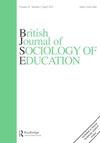Teacher activism: struggles over public education in Chile
IF 2.1
3区 教育学
Q1 EDUCATION & EDUCATIONAL RESEARCH
引用次数: 0
Abstract
Abstract While much has been written about student movements against the neoliberal privatisation of education in Chile, less attention has been given to teacher activism around similar educational matters. In this article, we contribute to the field of teacher activism as a social movement to resist the global education reforms of neoliberal education policies/practices. Data for the study were generated through yarning, photo-yarning and testimonios, methods often deployed in Indigenous and mestiza feminist research. Basil Bernstein’s theoretical work on pedagogic rights and democratic formations, initially developed in Chile, was used to analyse the data. Teacher activists argued that their collective struggles over what constitutes the public of public education, has interrupted the neoliberal agenda. However, battles over public education, its purposes, who should it serve, remain ongoing. New ways of privatising education are being enacted in Chile that are harder to resist, challenge and change.教师激进主义:智利公共教育斗争
虽然有很多关于智利反对新自由主义教育私有化的学生运动的文章,但很少有人关注围绕类似教育问题的教师行动主义。在这篇文章中,我们将教师行动主义作为一种社会运动来抵制新自由主义教育政策/实践的全球教育改革。该研究的数据是通过编织、照片编织和证词生成的,这些方法通常用于土著和混血儿女性主义研究。巴兹尔•伯恩斯坦(Basil Bernstein)关于教育权利和民主形成的理论工作最初在智利发展起来,被用来分析这些数据。教师积极分子认为,他们为公共教育的公众构成而进行的集体斗争,已经打断了新自由主义的议程。然而,围绕公共教育、公共教育的目的、公共教育应该为谁服务的争论仍在继续。智利正在实施新的教育私有化方式,这是难以抗拒、挑战和改变的。
本文章由计算机程序翻译,如有差异,请以英文原文为准。
求助全文
约1分钟内获得全文
求助全文
来源期刊
CiteScore
3.70
自引率
9.50%
发文量
74
期刊介绍:
British Journal of Sociology of Education is one of the most renowned international scholarly journals in the field. The journal publishes high quality original, theoretically informed analyses of the relationship between education and society, and has an outstanding record of addressing major global debates about the social significance and impact of educational policy, provision, processes and practice in many countries around the world. The journal engages with a diverse range of contemporary and emergent social theories along with a wide range of methodological approaches. Articles investigate the discursive politics of education, social stratification and mobility, the social dimensions of all aspects of pedagogy and the curriculum, and the experiences of all those involved, from the most privileged to the most disadvantaged. The vitality of the journal is sustained by its commitment to offer independent, critical evaluations of the ways in which education interfaces with local, national, regional and global developments, contexts and agendas in all phases of formal and informal education. Contributions are expected to take into account the wide international readership of British Journal of Sociology of Education, and exhibit knowledge of previously published articles in the field. Submissions should be well located within sociological theory, and should not only be rigorous and reflexive methodologically, but also offer original insights to educational problems and or perspectives.

 求助内容:
求助内容: 应助结果提醒方式:
应助结果提醒方式:


